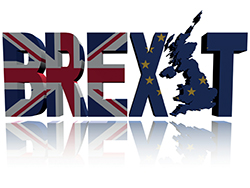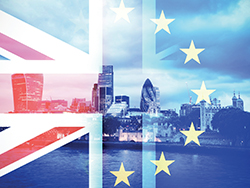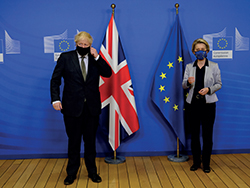 Following years of conjecture and concern, the post-Brexit trade deal between the UK and the EU arrived at the end of last year with little for the Channel Islands to worry about – in fact, plenty for them to cheer
Following years of conjecture and concern, the post-Brexit trade deal between the UK and the EU arrived at the end of last year with little for the Channel Islands to worry about – in fact, plenty for them to cheer
As the Brexit trade deal was finally hammered out by the UK and the EU at the 11th hour just before Christmas, Channel Islands politicians and finance industry professionals keenly scoured the 1,246-page agreement to ensure that it contained no unwelcome surprises.
For the islands, dependent as they are on financial services, the elephant in the room was the lack of reference in the EU-UK Trade and Cooperation Agreement (TCA) to the finance sector. A financial services memorandum of understanding was expected to follow in March.
In many respects, the finance community on the islands is relaxed about that. But there are areas of ongoing uncertainty.
Will the MoU force changes to the demeanour and behaviour of the City of London, with knock-on effects for the islands? And will MEPs posturing on blacklisting overseas territories with perceived competitive zero-tax regimes find traction with the European Council?
Despite these concerns, and with the characteristic optimism borne out of more than 60 years of success, the islands’ financial services industry remains pragmatic. It prefers to see opportunities arising from the changes rather than fretting about the challenges – many of which have been seen off before. It’s not complacent, but positive.
Moreover, mergers and acquisitions, corporate finance structuring, investment funds, insurance and private wealth are all areas in which the islands could reap benefits from their status in the new financial world. Industry practitioners have cautiously welcomed the outcome to date.
Protocol 3 moment
Gordon Dawes, Partner at Mourant, says: “It’s almost as if the UK has caught up with the Channel Islands in terms of its relationship with the EU.”
Referring to the arrangement by which the Channel Islands’ relationship with the EU is defined, he adds: “The UK has now had its Protocol 3 moment. It’s just the bare bones of a Brexit deal, and there’s scope for any amount of agreement from this point on. It’s the beginning of the story, not the end – but a good beginning, in my view.”
Also upbeat is James Gaudin, Managing Partner at Appleby in Jersey. “The UK customs union put in place in 2019 dealt with a lot of the issues we might have faced,” he says.
“The position of the islands and their status has simply been reconfirmed by the transition agreement.
“The risk that the sovereignty of the islands was going to be challenged has fallen away in favour of a more structured analysis of our regulatory and tax regimes. Having that restated is no bad thing, providing stability from an economic perspective, political perspective and regulatory perspective.”
There’s consensus that the TCA has, in some ways, strengthened the relationship between the islands and the UK. As Dawes puts it: “We’re in the same boat.”
Although this may be true, Guernsey and Jersey now need to place equal prominence on their relationship both with the UK and the EU, where there is no longer a so-called ‘friend in the room’.
Tony Mancini, Head of Tax at KPMG in Guernsey, says: “I get the impression we’ve probably drawn closer to the UK and built relationships that, over the last 10 years, might have been a bit fractured.
“Because we’ve tried to play the good guy in our relationships and because of the way we’ve worked with them over Brexit, it has helped to mend those fences a bit more.
 “Now, we have to go it alone to a certain extent. It makes the decision that Guernsey and Jersey took together to set up the Brussels office a good move. The role of the Brussels office will be even more important.
“Now, we have to go it alone to a certain extent. It makes the decision that Guernsey and Jersey took together to set up the Brussels office a good move. The role of the Brussels office will be even more important.
“We’ve really got to work hard at building relationships and trying to find other friends in Europe. There are member states that will be well disposed towards us but none of them will be of the size of the UK, and with the weight that it carried.”
Gaudin says: “Guernsey and Jersey are independent members of the World Trade Organization (WTO) and this notion of a greater degree of international personality is going to be a key theme across the piece.
“The status quo is really what everyone’s looking for. The devil is always in the detail and the new transitional arrangements, but generally people want to preserve the relationships that exist.”
City challenges
A factor that’s yet to fully play out is the transition from the UK being the islands’ ally in Brussels to the City of London being a potential competitor to the Channel Islands.
Dawes explains: “Guernsey and Jersey survived on whatever was different in the margins. We are both third countries now. The UK is its own regulatory master and can compete in that way. It has the freer hand that we have had all this time. Our fortunes go hand in hand with those of the City, but we are looking over our shoulder a bit more now.”
Mark Savage, Tax Director, BDO Guernsey, adds: “The biggest challenge now is if the City of London tries to reinvent itself – keeping pace with that and adapting accordingly.
"The City is going to have to do something to retain its strength as the centre of European financial services, because Frankfurt and Paris are going to be hopping up and down.”
Indeed, in February, Amsterdam overtook London as Europe’s largest share-trading hub in what many called a symbolic blow to the City.
Despite that challenge, for Gaudin there are “lots of reasons to be cheerful”. There’s dry powder in the market, which some say could lead to an investment fund boom; public and private M&A business is active; there’s optimism around real estate; and there’s been an increase in structured finance deals.
A cloud on the horizon has already emerged in the shape of a vote by MEPs to place British Overseas Territories on a new tax haven blacklist. However, even that seems something of an empty threat.
Ian Crosby, Head of Group Risk and Chairman, Stonehage Fleming, Jersey, points out: “It’s really important to note that the whole matter of 0% tax was an EU Parliament threat, rather than something that came from the Council of Europe (which sets the criteria for EU blacklisting).
“There’s a lot of water to flow before we get to this and there’s no cause for panic. But you’ve got to read the temperature and watch this one carefully. I’m confident that the islands have it at the top of their agenda and are watching carefully.”
Dawes adds: “The debate is one-sided and fails to take into account tax-neutral conduits of capital for cross-border investment. Also, there are low tax regimes within the EU, which are often overlooked, including in the Netherlands.
"There are double standards in the EU itself and no one proposes blacklisting EU states operating competitive tax regimes.”
“It’s hard to envisage a situation, bearing in mind our compliance with the existing agreements and arrangements in place across the European Union and in other member states, where you could seek to punish or prohibit certain types of business in one jurisdiction and not another,” says Gaudin.
 WTO win
WTO win
One undoubted benefit of the TCA for the islands is their new membership of the WTO, which Crosby says is long overdue.
“We’ve been trying to get that for 20 years,” he says. “It provides a base case for us, gives us access to global base rules of trade, which is not just in goods, it’s also in services across the gambit.
“I think that’s a win and while that membership is a helpful backstop, negotiated relationships and agreements will always have better outcomes. The efforts that the governments of Jersey and Guernsey and the UK are making around that, particularly in regard to the financial services part, are really important.”
Mancini says: “It gives us a legal mechanism to start to challenge some of the discriminatory measures that some jurisdictions have against us. It gives us something in our armoury to be able to defend ourselves.”
And what of the imminent financial services memorandum of understanding?
Joe Moynihan, Chief Executive Officer of Jersey Finance says: “For financial services, Jersey has access to the EU market through bilateral agreements and arrangements with member states, which are independent from the UK’s relationship with the EU.”
Crosby is bullish: “I’m hoping to see a good, settled negotiation around equivalence, passporting and access to each other’s territories.”
Meanwhile, Savage recognises that the way in which the City responds to the MoU could be pivotal for the islands. “The MoU will dictate to some degree the way that London moves and, because of our relationship with the City, we are going to have to adapt. Depending on where London chooses to position itself, that will drive a direction for us.”
Overall, the view is that the islands have everything to play for, and that they have a greater degree of independence and international personality.
Savage sums it up: “There’s plenty we can do. For example, we’ve got quicker access to the regulators and historically we’ve been good at moving quickly.
“We want to be famous for being good rather than famous for being tax-efficient. Our opportunity is to be that kind of thought leader.”